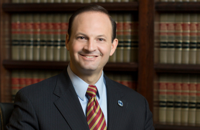
Wilson
CHARLESTON, S.C. - A judge in Charleston, S.C., questioned the city’s climate lawsuit against major oil companies, asking why the same legal theories wouldn’t apply to everyone affected by adverse weather and why the city limited its case to just a few oil companies when global warming has a multitude of causes.
“Weather is a constant, ongoing thing,” Judge Roger M. Young said in a Thursday hearing over Chevron’s request to dismiss the suit. “So if somebody gets to sue because of weather-related events, where does it begin and where does it end?”
Charleston’s contingency-fee lawyer, Dick Sher, struggled to convince the judge the city’s lawsuit wasn’t about greenhouse gas emissions but a “campaign of deception” by the oil companies that led ordinary consumers to burn more fossil fuels than they would have, had they known the real risks of global warming. But the judge didn’t seem to buy it.
“What are you trying to accomplish ultimately?” the judge asked. “Who are the clients and what do they get to sue for?”
Sher’s firm, Sher Edling, has been fighting an uphill battle to continue with litigation it devised as a way to win billions of dollars in damages from the oil industry and hefty fees for itself. Five state court judges have tossed climate litigation around the country, and President Donald Trump has warned Michigan and Hawaii that they better not file suits of their own.
Judge Young asked about President Trump’s order, saying it “appears to be some evidence that a national policy needs to be set,” instead of state courts imposing penalties in a haphazard manner.
“It’s not for the president to determine if federal law preempts,” Sher responded.
“I’m just saying it’s a little piece of evidence,” the judge countered.
“A very little piece,” Sher said.
Sher Edling devised the theory of recruiting states and municipalities to sue in state courts, citing state nuisance and consumer fraud laws, after federal courts rejected a previous round of climate suits as preempted by the Clean Air Act.
Sher compared the climate suits to similar litigation against tobacco and opioid producers, as well as lawsuits over the “forever chemical” PFAS. While most of those cases ended in settlements, a federal court upheld some parts of the deception theory against cigarette companies and PFAS litigation is ongoing.
Chevron Attorney Ted Boutrous said previous cases aren’t comparable, because tobacco and the other products were non-essential, while energy is a vital component of the economy. He also argued that despite how Charleston’s lawsuit is drafted, it is really an attempt to limit greenhouse gas emissions by imposing huge penalties on the oil companies.
“The plaintiffs are going to say this is only about misrepresentation, but it’s the alleged misrepresentation that made emissions in the U.S. and South Carolina higher than Charleston thinks they need to be,” Boutrous said. “And that’s just a policy issue.”
South Carolina Attorney General Alan Wilson filed a brief urging the judge to dismiss the case because it interferes with the interests of other states. Judge Young also asked whether allowing the case to proceed would have an impact on national security.
“If I say y’all get to go forward, what is Charleston going to ask this court to do?” he asked. “Punish the defendants for past problems? Punish for future problems? It’s the weather.”
The judge kept returning to the question of manageability and the impact of a profusion of lawsuits nationwide seeking to punish oil companies for global warming.
“Or, do you just have a class action lawsuit for everybody in your state that says `we’re bringing this on behalf of everybody in this state on behalf of everything that happened from the 1960s to today?” he asked.
As if on cue, news broke that a woman has filed a wrongful-death suit over the death of her mother, claiming she was killed by global warming caused by “Big Oil.” The lawsuit filed in King County, Wash. says Juliana Leon died of hyperthermia after pulling her car to the side of the road on a 108-degree day in Washington. Such a temperature would have been “virtually impossible” but for deception by the oil companies, the lawsuit claims.
“Defendants’ wrongful conduct, including their affirmative misrepresentations and omissions, transformed what was once impossible into reality,” the lawsuit says.
A Bucks County, Pa., judge recently became the sixth state court judge to reject a climate suit, following colleagues in Delaware, New York, Maryland and New Jersey. Companies like Exxon, Chevron and BP face dozens of lawsuits around the country, with state supreme courts in Hawaii and Colorado allowing them to proceed past initial dismissal efforts.
Government officials and the private lawyers they aligned themselves with fought to keep the cases out of federal courts, where defendants had stronger arguments. To keep them in state courts, they made claims under consumer protection and public nuisance laws.
Baltimore judge Videtta Brown called that "a way to get in the back door what they cannot get in the front door."
At issue is whether state court judges should have the power to essentially impact the international energy market. Twenty Republican state attorneys general argued to the U.S. Supreme Court that Honolulu's case involves questions of interstate and international law that can only be decided by Congress or in federal courts.
But other AGs disagree, and when President Donald Trump realized Michigan's and Hawaii's were planning to join the list of plaintiffs, he issued an executive order forbidding it.
Then he went to federal court looking for injunctions to stop them. A group of 14 attorneys general has filed a lawsuit of their own against the executive order in Seattle federal court.


